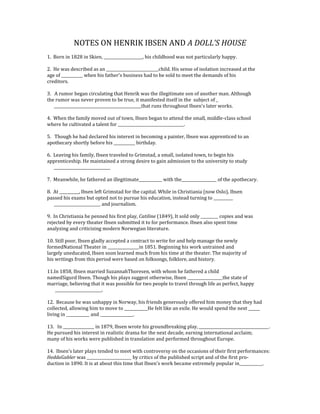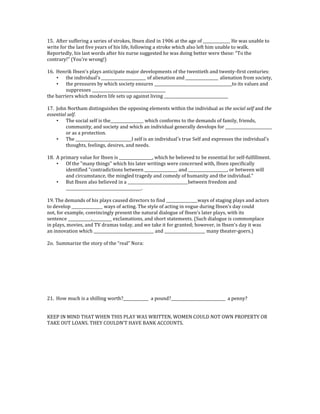Notes on henrik ibsen and a dollŌĆÖs house
- 1. NOTES ON HENRIK IBSEN AND A DOLLŌĆÖS HOUSE 1. Born in 1828 in Skien, ____________________, his childhood was not particularly happy. 2. He was described as an ___________________________child. His sense of isolation increased at the age of ___________ when his father's business had to be sold to meet the demands of his creditors. 3. A rumor began circulating that Henrik was the illegitimate son of another man. Although the rumor was never proven to be true, it manifested itself in the subject of _ _____________________________________________that runs throughout Ibsen's later works. 4. When the family moved out of town, Ibsen began to attend the small, middle-class school where he cultivated a talent for __________________________________. 5. Though he had declared his interest in becoming a painter, Ibsen was apprenticed to an apothecary shortly before his ___________ birthday. 6. Leaving his family, Ibsen traveled to Grimstad, a small, isolated town, to begin his apprenticeship. He maintained a strong desire to gain admission to the university to study _____________________________ 7. Meanwhile, he fathered an illegitimate____________ with the__________________ of the apothecary. 8. At __________, Ibsen left Grimstad for the capital. While in Christiania (now Oslo), Ibsen passed his exams but opted not to pursue his education, instead turning to __________ ________________________ and journalism. 9. In Christiania he penned his first play, Catiline (1849), It sold only _________ copies and was rejected by every theater Ibsen submitted it to for performance. Ibsen also spent time analyzing and criticizing modern Norwegian literature. 10. Still poor, Ibsen gladly accepted a contract to write for and help manage the newly formedNational Theater in ________________in 1851. Beginning his work untrained and largely uneducated, Ibsen soon learned much from his time at the theater. The majority of his writings from this period were based on folksongs, folklore, and history. 11.In 1858, Ibsen married SuzannahThoresen, with whom he fathered a child namedSigurd Ibsen. Though his plays suggest otherwise, Ibsen __________________the state of marriage, believing that it was possible for two people to travel through life as perfect, happy ________________________. 12. Because he was unhappy in Norway, his friends generously offered him money that they had collected, allowing him to move to ____________He felt like an exile. He would spend the next ______ living in ____________ and _________________. 13. In ________________ in 1879, Ibsen wrote his groundbreaking play, ____________________________________. He pursued his interest in realistic drama for the next decade, earning international acclaim; many of his works were published in translation and performed throughout Europe. 14. Ibsen's later plays tended to meet with controversy on the occasions of their first performances: HeddaGabler was _______________________ by critics of the published script and of the first production in 1890. It is at about this time that Ibsen's work became extremely popular in____________.
- 2. 15. After suffering a series of strokes, Ibsen died in 1906 at the age of ______________ He was unable to write for the last five years of his life, following a stroke which also left him unable to walk. Reportedly, his last words after his nurse suggested he was doing better were these: ŌĆ£To the contrary!ŌĆØ (YouŌĆÖre wrong!) 16. Henrik Ibsen's plays anticipate major developments of the twentieth and twenty-first centuries: ŌĆó the individual's _______________________ of alienation and _________________ alienation from society, ŌĆó the pressures by which society ensures ________________________________________to its values and suppresses ______________________________________ the barriers which modern life sets up against living _________________________________ 17. John Northam distinguishes the opposing elements within the individual as the social self and the essential self. ŌĆó The social self is the_________________ which conforms to the demands of family, friends, community, and society and which an individual generally develops for ________________________ or as a protection. ŌĆó The _____________________________l self is an individual's true Self and expresses the individual's thoughts, feelings, desires, and needs. 18. A primary value for Ibsen is _________________, which he believed to be essential for self-fulfillment. ŌĆó Of the "many things" which his later writings were concerned with, Ibsen specifically identified "contradictions between _________________ and ____________________, or between will and circumstance, the mingled tragedy and comedy of humanity and the individual." ŌĆó But Ibsen also believed in a _______________________________between freedom and _______________________________________. 19. The demands of his plays caused directors to find ________________ways of staging plays and actors to develop ________________ ways of acting. The style of acting in vogue during Ibsen's day could not, for example, convincingly present the natural dialogue of Ibsen's later plays, with its sentence ____________,__________ exclamations, and short statements. (Such dialogue is commonplace in plays, movies, and TV dramas today, and we take it for granted; however, in Ibsen's day it was an innovation which _______________________________ and _____________________ many theater-goers.) 2o. Summarize the story of the ŌĆ£realŌĆØ Nora: 21. How much is a shilling worth?_____________ a pound?____________________________ a penny? KEEP IN MIND THAT WHEN THIS PLAY WAS WRITTEN, WOMEN COULD NOT OWN PROPERTY OR TAKE OUT LOANS. THEY COULDNŌĆÖT HAVE BANK ACCOUNTS.


